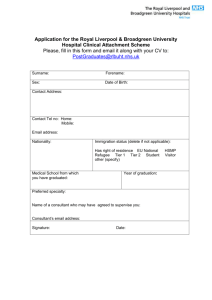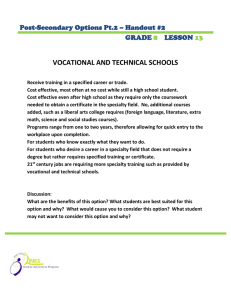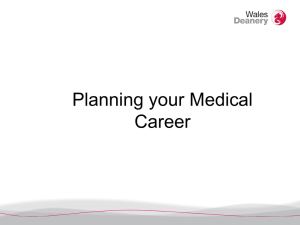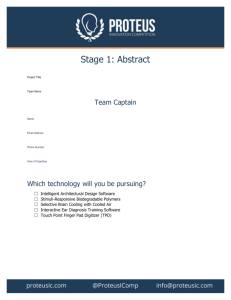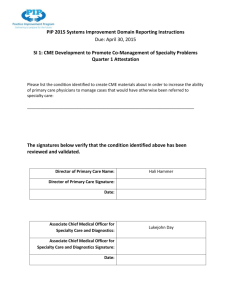Your Career Management Skills: Now, during the Foundation Programme and Beyond
advertisement
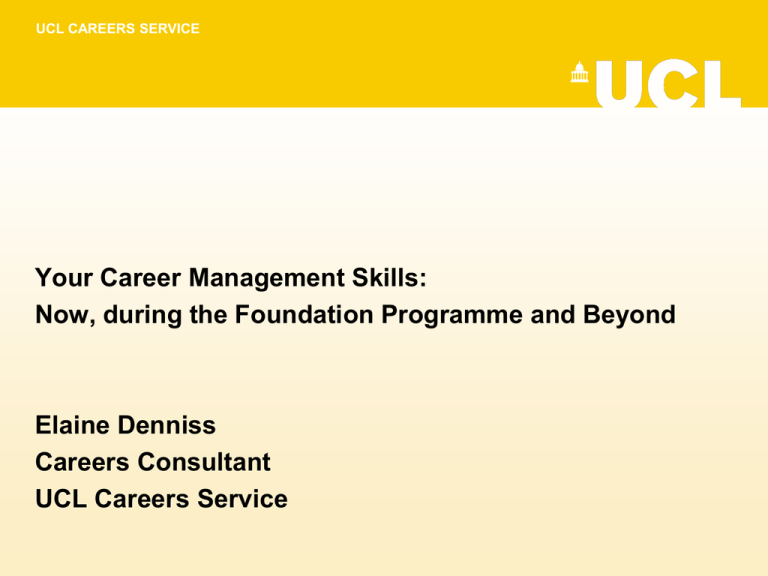
UCL CAREERS SERVICE Your Career Management Skills: Now, during the Foundation Programme and Beyond Elaine Denniss Careers Consultant UCL Careers Service What we will look at • Introduce four part career management cycle • Encourage reflection on your existing preferences and priorities • Look at ways to maximise your FP from a specialty choice perspective Four part Careers Management Cycle • Self Awareness – What’s important to me? • Option Generation – What’s available to me? • Decision Making – How do I choose? • Implementation – How do I make it happen? Making the parallel Clinical Decision Making • Taking patient history Career Decision Making • Self understanding • Examination/investigation • Exploring options • Differential diagnosis • Making a career decision • Treatment plan • Implementing actions Self Awareness • • • • Know yourself! Essential to recognise a good ‘career fit’ ‘What is important to be there in work What is important to be missing in work Think about yourself • What do you know about yourself already? • How can you find out more? Building the picture • • • • • • Values / Priorities Strengths Skills Stressors Personality Self report, feedback from others Your Priorities and Values • Working in a well known hospital • Community based • Hospital based • Opportunity to carry out research • Continuity of care • Geographical location • Work/life balance, regular hours • Variety • Clinical autonomy • Working with technology • Acute settings And ....? Different Roles of a Doctor • • • • • • • • • • Investigator Counsellor Researcher Organiser Decision maker Leader Entrepreneur Technician Strategist Social Worker ANY SUGGESTIONS? Career Priorities - Having an expertise - Continuity of care - Controllable hours Roles - Counsellor - Motivator - Researcher Strengths/Energisers - Relationship building - Linking information - Seeing the bigger picture Personality - Sensitive - Idealistic - Reflective - Creative Interests Allergies/Stressors - Human behaviour - Making decisions under - Mind/body interaction pressure - Policy/current affairs - Cutting into flesh - Solitary working Option Generation • • • • How many specialities do you know? Which ones appeal to you and why? Which ones do not attract you and why? Which ones are you just clueless about? Which specialty? +ves • Able to decide how much time to spend with patient • Able to apply cutting edge technology to patients • Flexible working hours • Supportive team working -ves •Need to let go of the patient – don’t have total control of patient •Frustration when colleagues do not agree with findings Which specialty? +ves • Looking after the patient as a person rather than just a medical problem • More simplistic and holistic approach to patient care • Dealing with patients and their families • Opportunities to subspecialise -ves •Seeing patients slowly deteriorating and dying on a regular basis •Do not always have easy access to most investigations Which speciality? +ves • Whole patient medicine. Not just involved in treating the illness but treating a particular person • Dealing with psychological effects on patient • Continuity of care - in contact with your patient for many years • Not a routine job – no two patients will respond to treats in the same way • Fast moving area of medicine • Multidisciplinary treatment of patient – always in contact with colleagues in a wide range of specialties • Growing speciality -ves •Draining – emotional support Option Exploration • • • • • • • • • Challenges – What makes the job exciting or stimulating? Demands – What does it take to be successful? Rewards – What do people enjoy or get out of the job? Prospects – What are the chances for future development? Limitations – What restrictions will this job place on you? Conditions – What kind of working conditions are typical? Downsides – What are the toughest bits of the job? Personalities – What are the people like? Alternatives – What other options have similar characteristics? How can you find out more? • On line resources eg medicalcareers.nhs.uk, LETBs, BMJ Careers • Engage with Royal Colleges • Voluntary work • Work shadowing • Using your network (information interviewing) Information Interviewing • • • • • What would you like to know? Which aspects of the job are you unsure about? The ideal vs reality, pros and cons The direction of the specialty Length of training Frame your questions in the right way • Why do you like being a Paediatrician? = A potentially limited question which is linked to THEIR self awareness/bias/needs • How much autonomy do you get in your work as a Paediatrician? = A focused question which is linked to YOUR self awareness/bias/needs Decision Making Ask yourself • Do I have enough information? • Have I tested my assumptions (image vs reality!) • Have I played devil’s advocate with my choice? • Are there any factors that I’m giving too much/too little weight to? Implementation • • • • Anticipate Prepare Practice Stand out! Situational Judgement Test – Five Professional Attributes 1. 2. 3. 4. 5. Commitment to Professionalism Coping with Pressure Effective Communication Patient Focus Working Effectively as Part of a Team Resources BMJ - Tackling Situational Judgement Tests http://careers.bmj.com/careers/advice/view-article.html?id=2365 Emedica http://www.emedica.co.uk/bmjsjt.htm GP Recruitment – Problem Solving Questions http://www.gprecruitment.org.uk/downloads/Example%20questions%20St age%202%20assessment%202011.pdf Foundation Programme (UKFPO) http://www.foundationprogramme.nhs.uk/pages/home/how-to-apply/SJTFAQs (including information on scoring) Maximise your Foundation Programme • Use your rotations as a chance to network with a range of fellow clinicians, at all stages of training • Explore taster courses and work shadowing opportunities if possible • Keep in touch with relevant Royal Colleges • Many Deaneries offer careers support workshops for F1/F2s • Complete clinical audit(s) (including re-audit, presentation) ideally resulting in service change • Seek out opportunities to make presentations (local, regional, national, international) • Seek out opportunities for teaching • Publications ‘Commitment to specialty’ • Relevant clinical work experience, e.g. rotations • Additional work experience – electives, voluntary work • Illustration of interests and preferences – SSCs, supplementary reading, research • Any involvement in relevant research – journal clubs, poster presentations, IBSc research, previous degrees, papers • Additional achievements - Prizes/Awards/exams • Royal College involvement - events/conferences, presentations/networking events • Extra-curricular activities – clubs and societies How can you stand out? Recruiter wish list Besides good clinical skills, recruiters want trainees who will... – Learn quickly...not need repetition – Take responsibility...not need direction – Decide reliably...not need correction – Show initiative...not need spoon-feeding – Push themselves...not need motivation – Stay...not change their minds What they want you to demonstrate... • • • • • Commitment to specialty Comprehensive preparation Communication skills and other competencies Clear and reliable clinical thinking Professionalism What you might face • • • • • • Application/portfolio-based interviews Competency-based interviews Scenario-based interviews Mock patient consultation / Simulation stations Situational judgement tests Presentations Personal qualities – Managing others & teamwork – Communication skills – Vigilance & situational awareness – Organisation & planning – Working under pressure – Empathy & sensitivity – Decision making – Problem solving & conceptual thinking Working with personal qualities • • • • • • • Understand and unpack skills Observe others in action Ask for examples/anecdotes Review and reflect on your own experiences Compile examples Fill gaps by gaining relevant experience Record learning Your Portfolio – What does it say about you as a doctor? • • • • • • Systematic Organised Logical thinker Good decision maker Reflective Proactive • • • • • • Researcher Teacher Scientist Clinician Mentor Leader Commitment to speciality Wider NHS issues • • • • • • Clinical governance Evidence-based medicine NHS reforms / Francis report GP commissioning Public health Integration of social and health care to meet demands of an ageing population www.medicalcareers.nhs.uk Finally, considering leaving medicine? • Talk to a range of people, both within and beyond medicine about your feelings and plans • What is it you are ‘trying to get away from’? • What is it you are ‘trying to reach’? • How are your peers managing in relation to these factors? Is this a ‘passing phase’ or a long term feeling? • How long have you been feeling like this – honestly? • What were the ‘triggers’ that made you feel like this? • There IS life beyond medicine – what suits you depends on the appeal/lack of appeal of parts of medicine • Talk to careers professionals within medical school, UCL Careers Service, Foundation Schools, Deaneries, BMA • Don’t worry – you’re not the first and you won’t be the last Medical Careers Post Foundation UCL CAREERS SERVICE PG LETB Medical School MBBS student Foundation School Foundation Trainee Specialty Trainee [Postgraduate Medical Training] UCL CAREERS SERVICE Basic Medical Career Structure MBBS Degree Less than FT training, time out, LAT, LAS non-training careers Foundation Programme (2 years) Academic Foundation Programme (2 years) GMC registration after F1 Specialty training – uncoupled, run-through Core specialty training Higher specialty training GP Training Academic Fellowship Programme CCT Senior medical posts Other Options: Academic Medicine Medical Education Work Abroad Research Core Specialty Training • Core Medical Training (2 years) • Core Surgical Training (2 years) • Broad Based Training (2 years then enter CT2 or ST2 ) – only 52 places offered 2013 through 7 LETBs • Psychiatry (CT1 – CT3) Themed Core Specialties (Acute Care Common Stem – ACCS) • Acute Medicine (CT1 – 2 + CT2 CMT) • Anaesthesia (CT 1 – 2 + CT2 Anaes) • Emergency Medicine (CT1 – CT2 + CT3 EM) • Intensive Care Medicine (currently through ‘parent’ ACCS pathways) Run Through Specialities • • • • • • • • • • Chemical pathology Clinical radiology General Practice Histopathology Medical microbiology/virology – microbiology Medical microbiology/virology – virology Neurosurgery Obstetrics & Gynaecology Paediatrics Public Health Time Out of Training The trend for F2s wanting a year out continues In 2013 a third of junior doctors took time away from formal UK training http://careers.bmj.com/careers/advice/viewarticle.html?id=20015702 http://www.theadventuremedic.com/features/taking-time-outfrom Out of Programme Experience (OOPE) Examples: The NHS Medical Director’s Clinical Fellow Scheme Darzi Fellowships in Clinical Leadership Specialty recruitment – the process Most specialties Register Application (November) (December) Interview/ assessment Offer/ clearing (December/ January) (by beginning March) GP recruitment and Broad Based Training Register (November) Test (January) Assessment centre (February) Offer (by beginning March) Specialty recruitment • Each specialty run by a Royal College, LETB or National Organisation (Units of Application) • Slightly different logistics for each pathway • Most applications open late Nov, but some are earlier (ACF & GP) • Details from the Oriel website !! TIP: Start familiarising yourself in your F1 year (or before)! Academic Clinical Fellowship • Targeted at doctors in the early years of specialty training (ST1 onwards). • Provides a clinical and academic training environment to help the trainee in post prepare a competitive application for a training fellowship for a higher degree (e.g. from NIHR, Wellcome Trust, Medical Research Council) or, if applicable a postdoctoral fellowship. • NIHR ACF posts are profiled for a maximum of three years, or up to four years for GP posts. Common topics on application forms • • • • • • • • Academic qualifications Awards and prizes Achievements Presentations Publications Teaching Audit Commitment to specialty Maximum points CMT(max 64) 1. Additional undergraduate degrees and qualifications -10 pts Degree obtained during medical course or prior to starting medicine – 1st class honours 2. Postgraduate degrees and qualifications – 10 pts PhD or DPhil 3. Additional Achievements – 10 pts National prize related to medicine 4. Presentations – 6 pts Have made an oral presentation or shown more than one poster at a national or international meeting 5. Publications – 8 pts Am first author or joint first author in more than one PubMed-cited research publication (or in press) 6. Teaching Experience – 10 pts Have designed and organised a regional medical teaching programme consisting of at least two sessions and I have undergone formal training in teaching methods lasting between 5 and 20 days 7. Clinical Audit- 10 pts Have designed and led an audit or quality improvement proejct leading to a documented change in Source: CMT shortlisting criteria practice and I have presented it at a meeting Maximum points (free text) • Achievements outside medicine: ‘One or more truly outstanding achievements, on a scale beyond the capability of most people, utilising many relevant skills and qualities’ • Commitment to specialty: ‘Clear understanding both of self based on good evidence, and of what the specialty involves based on extensive exploration. Clear Source: RCPsych shortlisting criteria reasoning’ What can you boost? • • • • • • • • Academic qualifications Awards and prizes Achievements Presentations Publications Teaching Audit Commitment to specialty Can do very little about by F2 year Might do something about Specialty Training - Resources www.oriel.nhs.uk www.specialtytraining.hee.nhs.uk www.gprecruitment.hee.nhs.uk/ www.nihrtcc.nhs.uk (for academic clinical fellowships)
